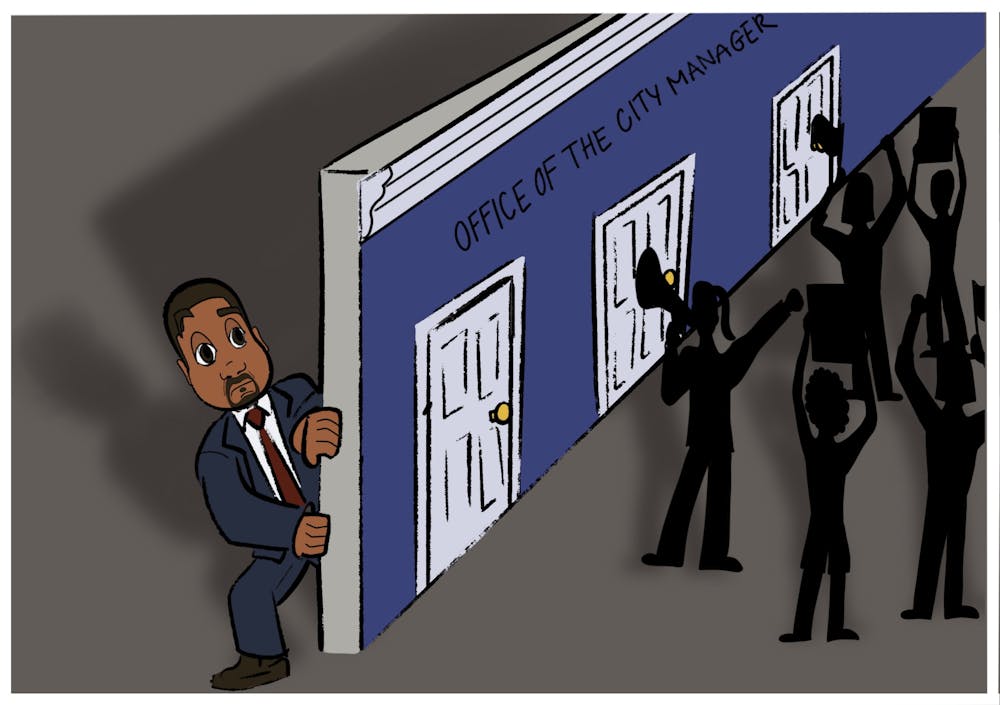There is a new mayor in town. If that statement sounded like a very important piece of news, don’t worry — it’s not. Here in Charlottesville, the mayor has no outsize influence on who gets hired and fired, which projects continue and how plans are implemented. The mayor is merely the member of the elected City Council who is chosen to lead it. Instead, the crucial responsibilities of city governance fall to the City Manager, a post that is both unelected and has been historically ineffective in meeting the needs of Charlottesville residents. In order to ensure that the chief Executive personifies accountable and productive leadership in Charlottesville, reform of our local political system is needed — we should replace our nonrepresentative City Manager with an elected and empowered mayor.
Before 1922, this was exactly the system we had — a strong mayor equipped to enact the policies that a strong City Council passed. There was not a City Manager overseeing democratic legislation despite not themselves being elected. But, amid a nationwide gust of progressive reform, mayors were deemed to be less effective and a risk to exacerbating corruption in government. And so, the mayor-council system was replaced with the council-manager form of governance that remains today. The elected City Council now chooses the City Manager to carry out the changes planned and voted upon by the City Council. This appointed City Manager ideally serves a four-year term. In this way, the City Council functions more like the board of a company or a non-profit. They possess mainly oversight powers, as opposed to serving as a properly democratic legislative body for the citizens who elected them.
Since the appointment of a City Manager is a step away from representative democracy, we risk our governance becoming both ignorant to the issues of the voters and unaccountable to their sentiments. Having a City Manager who is not accountable to the people, and who is often an outsider, inevitably creates a disconnect where the City Manager is neither intimately aware of city problems nor politically beholden to respond to the views of voters. By putting decisions in the hands of representatives who must be reelected and are thus responsible to Charlottesville citizens, recognition and progress on critical issues can more effectively be achieved.
The realities of City Manager unaccountability is already clear in Charlottesville. For example, in 2021, then-City Manager Chip Boyles fired Charlottesville’s first black female police chief RaShall Brackney without cause. This unilateral decision received great opposition from those in the community, but Charlottesville citizens could not hold him directly accountable. And though Boyles ultimately resigned, the fact that he fired Brackney to begin with is indicative of the obstinance that the current status quo perpetuates. Such an example does not sit in a vacuum, nor is it an uncommon reflection of the council-manager system — other cities such as Dallas have similarly had issues where city managers acted against the vocal interests of voters
The current system leaves the residents of Charlottesville at risk with only one recourse for wrongful action — they must hope that their calls for change are heard and align with the whims of a weak City Council. With an elected mayor, there would be a double layer of representative insurance. While a mayor-council system would not guarantee that every action was done directly to voters’ likings, both the legislative and executive forms of governance would be more attentive to citizens and would consider them more highly in their decisions.
Many defenders argue that the council-manager system produces more efficient and qualified governance. However, in Charlottesville at least, the current system of government has proven to be resoundingly inadequate on these fronts. In the last six years alone, there have been six City Managers, and the frequent vacancies do not stop there. Because the City Manager is empowered to hire and fire city employees, new leadership at the top often means changes within bureaucracy in the middle. At one point in 2021, for example, vacancies in Charlottesville government included the City Manager, the human resources director, the human rights director, the Housing director, several Deputy City Managers and others. This slew of departures from the top down causes a struggle to even compose an annual budget, the bare minimum of local governance which the council-manager system is supposed to support. Having an electoral system for those who make decisions and control Charlottesville’s city employees might help to ease these vacancy troubles by ensuring regular transitions at the top which would depress resignations at lower levels.
Contrary to what the City Council and City Manager seem to believe, Charlottesville is not a corporation or a non-profit. It is a city and a democracy. Governance should always be of the people, by the people and for the people — this is our north star, the way in which we ensure responsible and representative governance that recognizes and responds to the issues of voters. Through reverting to the mayor-council system, we can better establish proper, accountable and effective representation for every member of our Charlottesville community.
Wylie Brunman is an opinion columnist who writes about politics for The Cavalier Daily. He can be reached at opinion@cavalierdaily.com.
The opinions expressed in this column are not necessarily those of The Cavalier Daily. Columns represent the views of the author alone.







